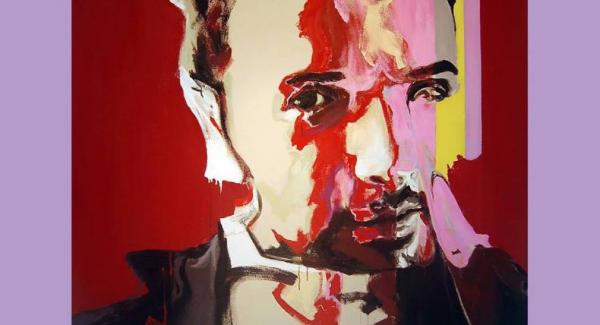Jason Bajada Reflects on 10 Years of Loveshit

Graphic: Valery Lemay
For most up-and-coming artists, there’s a balancing act between channeling their influences and developing their own unique identity. When looking back on his third and breakthrough album, Loveshit, 10 years on from its original release, Montreal singer/songwriter Jason Bajada credits the album’s success with striking this balance for the first time on record.
“I think that came about from finding my sound,” Bajada describes. “I experimented with the recordings, I had done two previous independent albums, but this record just felt like I was singing with the voice I was supposed to be singing with. For the first time I was proud of my songwriting chops and really channeling a true emotion as opposed to mimicking my heroes.”
Released in February 2009, Loveshit is a break-up album filled with melancholic songs that never become maudlin, thanks to Bajada’s ability to write seemingly effortless melodies. This talent is displayed best in enduring songs like “Ten Days in Miami” and “Tired of Talking.” Though greatly appreciated by Bajada, the fact that listeners connected with his contemplative ruminations on a broken relationship is a peculiar situation not lost on the songwriter himself.
“It’s the weirdest job in the world to be paying your rent with your feelings,” Bajada says. “I think the strangest thing is being applauded for it – literally someone’s Friday evening is buying tickets and coming to see you and singing along to this sadness. It’s such an odd way of life, and still to this day it baffles me, [but] I love it, it’s what I’ve been doing my whole life. I’ve avoided having a real job because I’ve been channeling my emotions and spending time writing music, which is such a beautiful thing, but I never get used to it.”
Loveshit was also Bajada’s first album for venerable local label Audiogram, and it secured the artist a publishing deal at a time when the music industry’s money-making days were entering decline. While Bajada contends that being on a label assured quality control, the artist is impressed by the new generation of independent artists who are more self-motivated and self-reliant than ever.
“I find today it is too easy to put music out,” Bajada remarks, “but at the same time I feel like I meet, even through my podcast [Bajada Dialogues] or the industry, 21-year-olds who have their shit together, it’s unbelievable. They understand everything I understood only at 28, and I find that super admirable. The Internet either dumbs down people or let’s people who use it correctly become these wiz-kid geniuses.”
To celebrate Loveshit’s 10th anniversary, Bajada has three shows planned where he will perform the album in its entirety. However, as it’s been a minute since Bajada has played the deeper cuts off Loveshit live, the artist has been relearning his own material. He likens it to performing cover songs. “Every song you write feels like it’s the last song you’ll ever write,” Bajada explains, “and that you don’t even know how it happened or how you can even do that. It’s like there’s some sort of weird magic that happens, and to kind of re-explore songs now that they feel like covers… you forget you could even write those melodies or certain lyrics, like ‘hang on, I didn’t remember writing that.’”
Other than the album festivities, Bajada is currently keeping a low profile on the music front. Other than a new single, “Worry ‘Bout You,” released in conjunction with Loveshit’s 10th anniversary, his last album was released back in 2017. Entitled Loveshit II (Blondie & the Backstabberz), the double album was a sequel of sorts to Bajada’s 2009 album and delved into the depths of his anxieties and depression after the disintegration of a relationship and a few close friendships.
Fortunately, Bajada has been in a much healthier state of mind since writing his last album. Not only does Bajada meditate every day, the songwriter even took a trip to the Magdalen Islands for a month last summer and worked on his trade, trying to take a step back from his style of personal songwriting to work on a more observational perspective to better process his emotions. “I kinda look up to heroes of mine like Tom Waits,” Bajada explains, “who has the perfect normal family life, but becomes an actor when he performs and channels certain past emotions and characters or writes about other people themselves,”
After over fifteen years of paying rent with his feelings, through all the turbulences love and life has thrown at him, the one thing that has stayed consistent for Bajada as an artist is the awe of crafting a song and bringing it to life, even when it seems nothing more could be wrung out of the well.
“Still to this day,” says Bajada, “nothing really makes me happier than being in studio or finding that melody at 2:00 in the morning, finalizing this demo that nobody’s ever heard except you. Just finalizing and mixing yourself, this shitty kind of demo at two, three, four in the morning and crashing into your bed and listening back or hopping out into the car to see how it sounds. And this thing that didn’t exist 12 hours prior being this hot recipe you’re excited to release that might only come out in a year, year and a half, but just that moment of creation and finalizing something that didn’t exist a few hours prior, still to this day is the ultimate drug for me.”
Jason Bajada performs Loveshit in its entirety at Le Ministère (4521 St-Laurent) on Tuesday, Feb. 12, 8:00 p.m., $30





